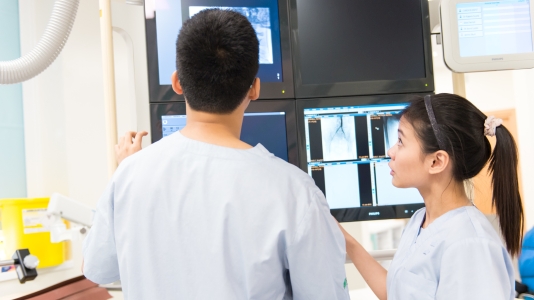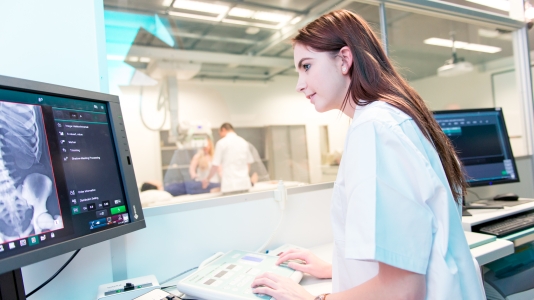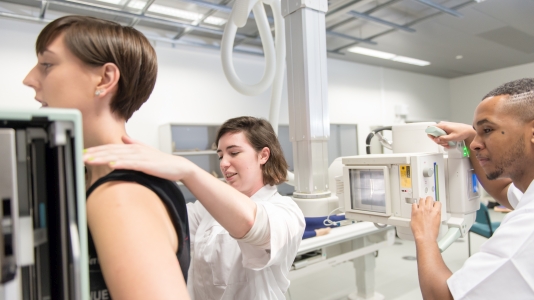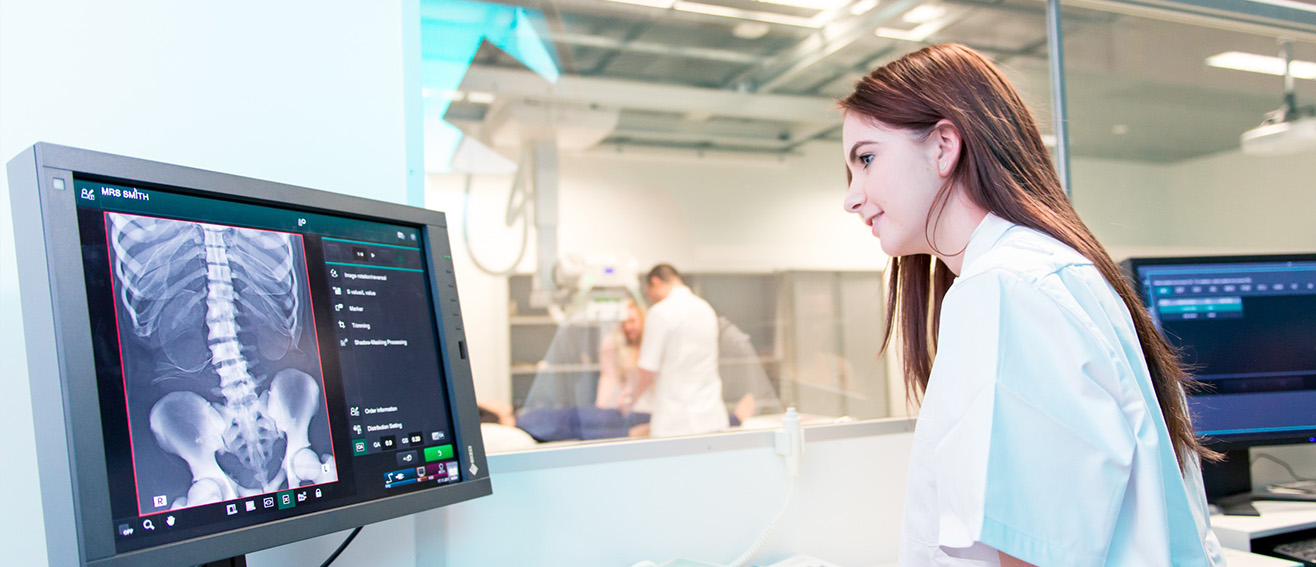Overview
Facilitating your development
Our programme incorporates a high level of clinical skill in the practice of image evaluation and reporting of the chest. The modules fully integrate theoretical knowledge with practical ability, facilitating your development as a competent and reflective practitioner.
We have a highly motivated team of in-house and guest specialists from a variety of hospitals and over 25-years experience successfully delivering the Radiographic Reporting programme at LSBU.
 |  |  |
 |  | 
|
Why Radiographic Reporting at LSBU?
- poll
- Ranked 2nd in London overall for Health Professions (Guardian University Guide 2023).
- chain
- Our course is a long established and successful programme, having started in 1996.
- heart
- You can expect to be trained by our renowned teaching team of experienced radiographers in our specialist facilities.
- medkit
- Specialist reporting radiographers and radiologists provide stimulating lectures.
- user-md
- 94 percent of Health Professions graduates get graduate level jobs or are in further education at professional or higher education level, within 15 months of graduation (Guardian University Guide 2023).
- rocket
- LSBU Health and Social Care graduates are the second highest paid amongst all London Modern university graduates, and the sixth highest in the UK one year after graduating (DfE LEO data 2022).
Accreditation

- The Radiographic Reporting course offered by London South Bank University is pending re-approval by the College of Radiographers.
| ModePgCert Part-time | Duration1 year | Start dateSeptember | Application code5064 | Application method Direct to LSBU |
Watch our video to see how you can make yourself at home studying at LSBU.
Location
London South Bank University student union is located at 103 Borough Rd, London SE1 0AA.
If you are visiting our Southwark Campus, you may wish to use our downloadable campus map (PNG File 466 KB). For information on accessibility, see our DisabledGo access guides. See our location page for more details.
Entry Level Requirements
Need further information? Call us on 0800 923 8888 to discuss entry requirements.
- Applicants will normally be a registered radiographer, or other health care professional, with full access to radiographic images for reporting that should include a range of referral types, including, but not limited to, Emergency Department, critical care, outpatient and GP.
- Participants should have written confirmation and support of an appropriate radiology department in which to train.
Choose your country
Select country here:
Missing English and Maths qualifications?
If you do not have the required English and Maths qualifications needed to satisfy the entry requirements for this programme, we have courses available at our partner College that you can take to upskill in these areas. Find out more at South Bank College.
United Kingdom
£3855
Tuition fees for home students
International
£6200
Tuition fees for international students
Tuition fees are subject to annual inflationary increases. Find out more about tuition fees for Undergraduate or Postgraduate courses.
-
Part-time
part-time
PgCert Radiographic Reporting (PT) - Year 1
UK fee: £3855 International fee: £6200 AOS/LSBU code: 5064 Session code: 1PS00
Many students are funded by their employer/Trust as part of their professional development. Speak with your employer to find out if there is CPD funding available.
A student can change to writing up status for the purpose of a lower fee when the examination arrangements have been submitted and approved. Examination arrangements are submitted 3 months prior to submission of the thesis for examination. A student only has one year of writing up at the reduced fee that covers submission, viva, and minor corrections. The writing up fee 25/26 is £1,246
Home
| Mode PgCert Part-time | Duration 1 year | Start date September | Application code 5064 | Application method Direct to LSBU |
When applying for the course please upload a signed letter from your mentor and manager to confirm that you will be supported with time and training for clinical reporting.
Accreditation for Prior Learning (APL)
Potential applicants with previous credits for similar modules can be considered for APL towar an award. No more than 50% of the credits for an award can be from APL’d credits.
Prepare to start
We help our students prepare for university even before the semester starts. To find out when you should apply for your LSBU accommodation or student finance read the How to apply tab for this course.
Enrolment
Before you start your course we’ll send you information on what you’ll need to do before you arrive and during your first few days on campus. You can read about the process on our Enrolment pages.
PgCert (60 credits)
- Foundations of Image Interpretation (20 credits)
This online module introduces the principles of images perception and the opportunities for error in decision making. The implications for practice are considered from abnormality signalling through to written reporting, for integration within a modern healthcare system. Assessment method: 4000 word essay. 100% weighting - Radiographic Reporting: Chest (40 credits)
This module enables the participant to achieve competence in the practice of radiographic reporting of the chest. Most of the study element will be in the clinical environment working with a mentor in partnership with the module coordinator, to ensure all academic components are met. Participants will be working within the healthcare environment and must have authorised access to radiology imaging, including a mix of acute and non-acute chest cases for review.
After successful completion of the Pg Cert Radiographic Reporting students will be eligible to study the Pg Dip / MSc Diagnostic Imaging modular programme for higher award.
Careers
This programme will assist in developing graduates career options as a practitioner, consultant, or researcher.
The course offers a flexible and responsive education and training provision which follows the requirements in respect of Continuing Professional and Personal Development (CPPD), linked to professional regulation and the Knowledge and Skills Framework (KSF).


